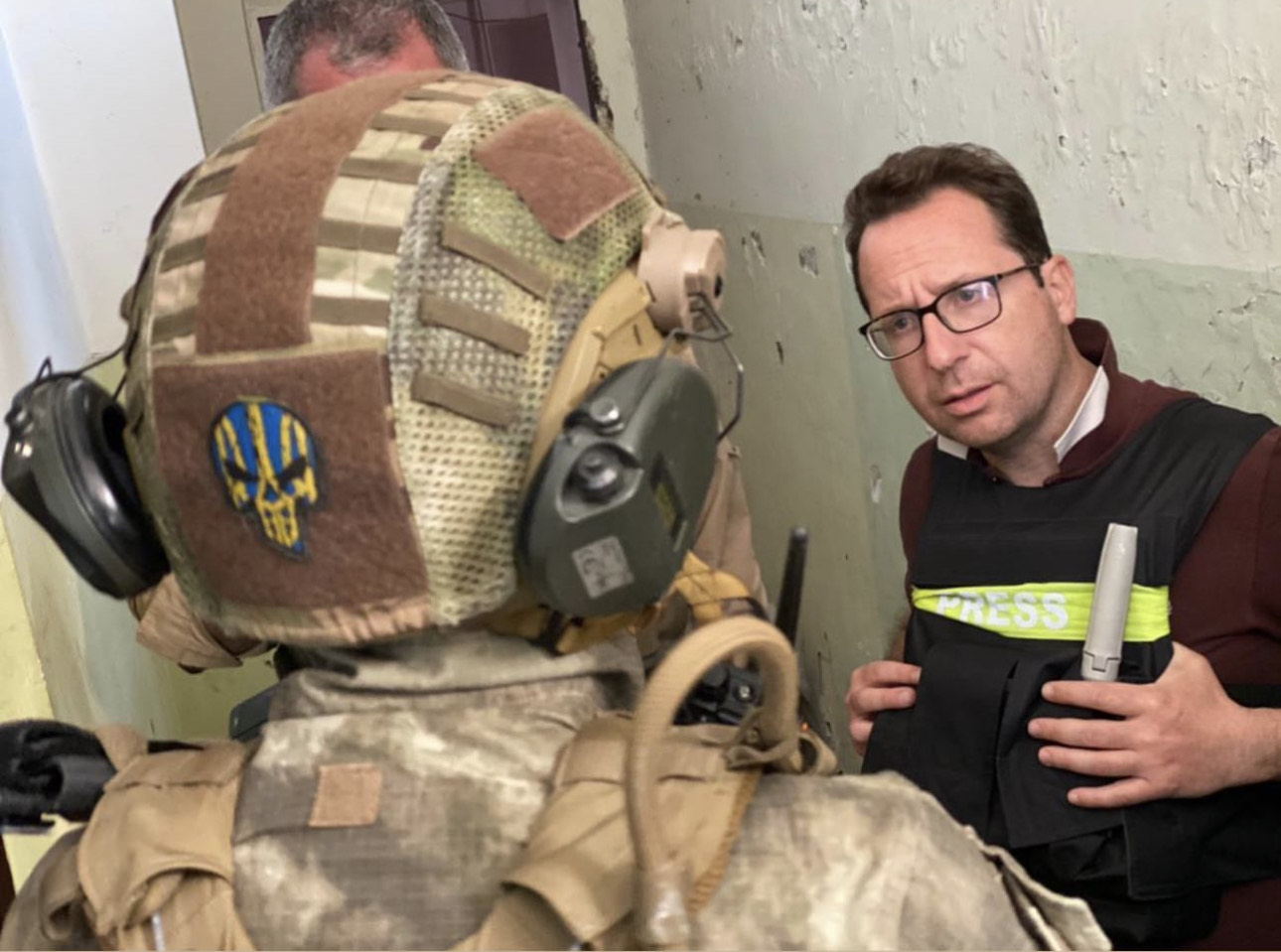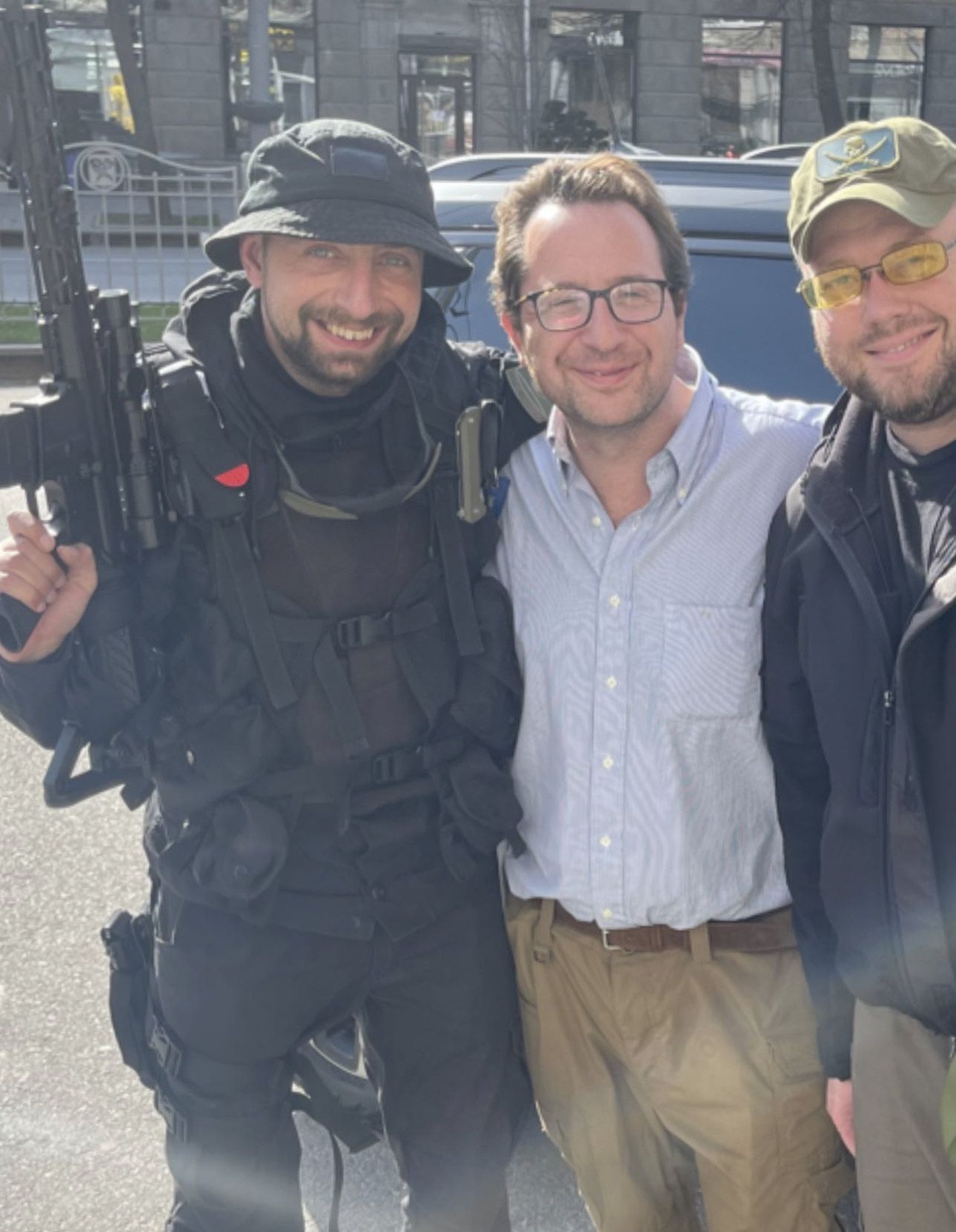Mattia Sorbi is a 44-year-old freelance war reporter who collaborates with Repubblica, Radio 24 and Rai Uno. In 2021 he was injured in Ukraine.
Despite the incident, in the coming days, he will set out again, this time for Israel. He told us that wanting to return to the field is normal. He answers the video call as he is on his way to the police for a final check of documents before departing for Tel Aviv.
We continue the conversation over the phone between the Acrimònia editorial office and the noisy means of transportation in Milan.

Mattia, tell us about when you were injured.
I was in Ukraine to do my job, moving around frequently in search of testimonies. I was in a car, on the move. My driver had spoken to a Ukrainian soldier who had confirmed the road we intended to take was completely safe and had allowed us to pass. Unfortunately, the road was not secure, and the Russians opened fire.
They opened fire?
I thought we had driven over a landmine, but in reality, Putin's soldiers had attacked us. They didn't realize I was a journalist and started shooting. There was no hope for my driver, but I survived.
It must have been terrible.
In cases like these, you analyze what happened. What happened to me is a war crime. There's an international commission looking into my case and similar ones. Moreover, I would appreciate the Ukrainian army acknowledging the responsibility of their soldier at the checkpoint.
On a technical level, that's precisely the point. I'm not trying to shift blame onto him. The soldier at the checkpoint should have been certain that the Russians wouldn't be on the road we were about to take.

Why did you become a war reporter?
As a teenager, I dreamt about it, but I never thought I'd actually get there. Then life happened, and I found the opportunity to do it.
Can you explain further?
I studied Political Science at the Catholic University, and I was passionate about Robert Capa's photography. As you can see, I'm talking about an interest in the "aesthetics of war" rather than a conscious decision to intervene in a war zone.
I started as an expert in international relations, with journalism coming later.
When?
It began with an opportunity in the USA as a correspondent for Panorama.
How did you end up on the battlegrounds?
It all started with a phone call in 2014. I was 35, and I began collaborating with Radio24. I realized that my career would change by going to the Donbass.
And what did you do?
At that time, I had just returned from Buenos Aires, where I dealt with South American politics. I immediately dropped everything and headed to the Donbass.
At that time, not much was being said about Ukraine.
That's true, but the conflict was real. I went to Donetsk after the Euromaidan protests, right at the moment when the Russians entered the city.
How do you transition from a metropolis to a war zone?
I was assisted by a more experienced colleague. Carlotta Gall from The New York Times gave me some pointers, and we made the journey together to Donetsk.
What is the relationship like between war journalists?
There's competition. I'm competitive too, but there's healthy rivalry aimed at the quality of the storytelling.
What did you do next?
Upon reaching Donetsk, I found myself in the midst of the battle of Ilovaisk, which was very brutal. There were gas masks everywhere. That was my baptism.
What worried you the most?
One of my initial thoughts was practical: "Where can I find a helmet and a bulletproof vest?".

Have you never been afraid?
Of course, I've been afraid. I continue to be afraid.
Do you consider yourself a courageous man?
My courage is driven by passion. It pushes me beyond fear.
What does it take to become a war reporter?
Ambition. Being in the field and, at the same time, shaping the narrative of an international conflict makes you feel at the center of history.

Let's talk about Kabul.
In 2021, my career as a war reporter took off. I documented what was happening in August, when the Americans withdrew their troops from Afghanistan, and the Taliban regained control. I was the third European journalist to enter Kabul.
Tell me about a typical day in a war zone.
There are common elements in the wars I've been a part of. First of all, the alarm usually goes off around 6am. Unless there's a bombing: in that case, we wake up at 5am.
"Waking up to a bombing" gives me chills.
When they bomb, and I wake up, I'm more productive. In those moments, the Milanese in me comes out, war or no war.
So, what do you do after waking up?
During the day, we write or go live, depending on whether we work for print or television.
The day is short in conflict zones due to the curfew. When we return, we make the most of the remaining time to prepare for the next day.
What's the service you're most proud of?
My interview with Zabiullah Mujahid, the Taliban spokesperson. I talked to him about foreign policy and international relations. It was a very important moment.
How did you manage to contact him?
He's an institutional figure. The Taliban had a great deal of respect for Western journalists.
Zabiullah Mujahid didn't give many interviews, but I was able to secure one.
So, it's not just about being there to tell the story.
Photographs are crucial. They bring the narrative to life. Another essential factor is timing. You need to be among the first three reporters in the world to cover an event to make a difference. You can't let any opportunity slip by.

You're heading to Israel. When will you be back?
Good question! I have the opportunity to stay away for quite a while, and I plan to return to Italy for Christmas.
The conflict between Israelis and Palestinians will last a while and be dramatic. I want to talk about this war, taking all the time I need.
Is it necessary to stay away for so long?
It's not necessary, but it's important to truly understand conflicts and make them your own in order to talk about them, or in my case, write about them.
Are you going to Israel alone?
Yes, despite everything, Tel Aviv is still not extremely dangerous.
Do you have a plan of action?
Absolutely, I'm already working on it. I have contacts with whom I'm starting to collaborate, particularly for filming.
In the coming months, I'll also try to get in touch with the Palestinians.

How much freedom of expression does a war journalist have?
We can't fool ourselves into thinking that the Western press can make great criticisms of the world to which it belongs. However, we are fortunate because we start from a liberal perspective and with full respect for human rights.
Every journalist is free to report what they believe is right.
Why is it sometimes thought that they are not?
No one has ever censored me, but at times, I've had to self-censor.
Why?
To avoid making theoretical analyses of the conflict. My job is to report what happens and not engage in geopolitics.
You should write a book someday.
There's something in the works. I was supposed to talk about my work in Ukraine at some festivals. Unfortunately, I'm leaving. I'll add the experience of the Israeli-Palestinian conflict to the book I'm going to write.
Photos by Mattia Sorbi
.jpg)